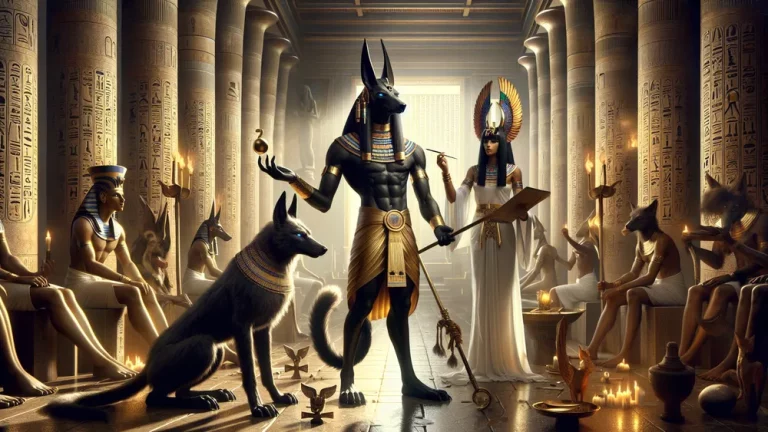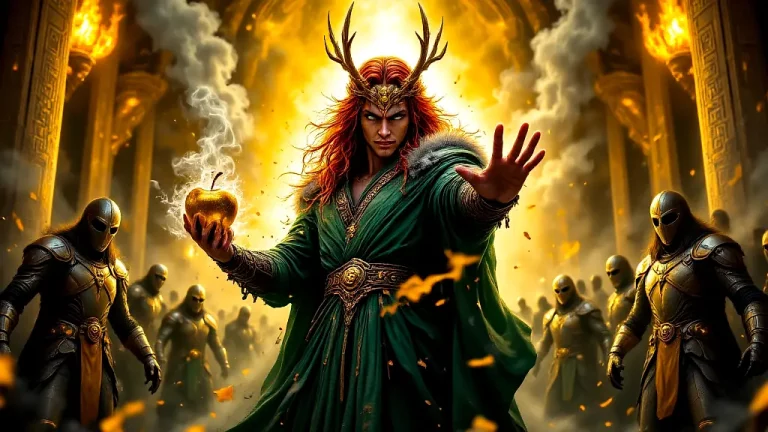Epimetheus: The Greek Titan Of Afterthought And Excuses
Within the large mix of Greek stories, Epimetheus seems like a sign of thinking later and what happens when you make quick choices. Consider a moment when a person buys a costly device on a whim, skipping over their budget, discovering only later the strain on money it brings. This really relates to what Epimetheus means in myths, where his responses frequently mean side effects nobody saw coming.
Key Points:
- Epimetheus is a Greek Titan known for afterthought and excuses.
- His parents are Iapetus and Clymene, making him part of the Titan family.
- He has notable brothers: Prometheus, Atlas, and Menoetius.
- The tale of Pandora’s Box highlights his impulsive choices.
- Epimetheus married Pandora, the first woman created by the gods.
- His actions warn against making quick decisions without thinking ahead.
- Lessons from his story include the need for planning and listening to advice.
When we check out this story about Epimetheus, a Greek Titan, we get to see his family, his important place in the story about Pandora’s Box, along with how he connects with his brother who thinks ahead more, Prometheus. Through seeing this, we understand more about people and the age-old ideas of seeing ahead versus thinking afterward.
Epimetheus: Overview and Key Facts
| Key Aspect | Details |
|---|---|
| Identity | Epimetheus is a Greek Titan seen in the story of Pandora’s Box, where he makes excuses and acts on afterthoughts. |
| Family Background | He comes from Iapetus and Clymene, which puts him in the next Titan group in Greek legends. |
| Brothers | He shares his life with Prometheus, Atlas, and Menoetius, and they each get involved in important Greek legends. |
| Role in Stories | Mainly recognized for his part in Pandora’s Box tale. He takes Pandora as a gift, causing many bad outcomes for people. |
| Partner | His partner is Pandora, the first woman by gods, whose curiosity leads to problems in the world. |
| Symbolism | He stands for the idea of not thinking ahead, usually making quick decisions without future thoughts on what might happen. |
| Impact | This tale becomes a warning about the need for planning and what can happen when not enough thinking ahead is done. |
What’s Epimetheus All About in Greek Myths?
When we dig more into what myths about Epimetheus tell us, we find the little things about who he is and his important dealings with other legendary folks. Though not the most famous, his story and connections let us see how he fits into Greek mythology.
Getting to Know Epimetheus
Epimetheus is a well-known figure from Greek mythology and one among the Titans, a group of strong gods who came before the Olympian gods. He is the son of Iapetus and Clymene, which puts him in family roots deeply set in ancient Greek myths. His name actually means “afterthought,” since he acts without thinking ahead often, which is a big part of his stories. Think about a person who makes choices quickly without looking at what might come later.
That is much like how Epimetheus behaves. His family links add more to what we know about him, connecting him to many important characters. Notably, his brother Prometheus, known for being wise and looking ahead, is often the opposite of Epimetheus, who is more on the spur of the moment. Plus, marrying Pandora, who was the first woman made by gods, puts him at the center of one of the famous Greek stories. Here are a few of his important family links:

- Parents: Iapetus and Clymene
- Siblings: Prometheus, Atlas, and Menoetius
- Spouse: Pandora
Epimetheus, a Titan from Greek mythology known for his impulsive decisions, is the son of Iapetus and Clymene, brother to the wise Prometheus, and married to Pandora, the first woman created by the gods.
The Tale of Epimetheus and Pandora’s Box
In the story about Pandora’s Box, Epimetheus is important in what becomes one of the long-lasting stories in Greek mythology. It starts with when Pandora, the first woman, was made by the gods as a present – or maybe a trap – for people. Zeus, in charge of the gods, made Pandora to get back at humans for Prometheus taking fire.

Despite Prometheus’s warnings to be careful of gifts from Zeus, Epimetheus, and his name means “afterthought,” let Pandora into his life. This choice was on impulse, not planning, much like when someone quickly takes a gift without thinking what might happen later. They don’t look ahead. Because of this decision by Epimetheus, outcomes were big and spread far.
Pandora, curious, opened the jar, which people often call a box, that she was told to keep shut. And when she did that, she let out many bad things into the world – things like sickness, death, and sadness, changing people’s lives forever. The only thing left in the box was hope, giving a small bit of peace among the trouble.
This story is a strong reminder about how a single moment without thought can affect everyone for a long time, not just one person but all humans. Epimetheus and Pandora’s Box are rich in symbols, especially around ideas of thinking afterward and making excuses. Epimetheus shows how acting without foresight can lead to needing excuses afterward.
This part of him warns us about acting quickly and how important it is to think about what could happen. Also, it reflects humans often act first, think later, bringing up the need to defend or fix what was done. Through Epimetheus’s tale, he lets us understand that thinking ahead and being careful matter a lot in dealing with the many twists of life.
Epimetheus and Prometheus: A Brotherly Comparison
In the story of Greek mythology, the brothers Epimetheus and Prometheus are different people, each with their own traits shaping their parts in the stories. Prometheus, whose name says “forethought,” is known for being wise and planning ahead. He made a name for himself by taking fire from gods and giving it to humans, which means light and progress.
Think of Prometheus as someone planning many steps ahead to get the best end result. On the other side, Epimetheus, his name meaning “afterthought,” often acts first without seeing what might come later. His choice to take Pandora despite what he was told shows he acts fast and thinks later, much like a person who leaps before looking. It is risky.
This key difference in how they make choices makes clear bigger ideas of planning ahead and acting without thinking that are part of being human.
To explain more how these brothers differ, here is a simple table that lines up their traits and actions:
| Aspect | Prometheus | Epimetheus |
|---|---|---|
| Name Meaning | Forethought | Afterthought |
| Key Trait | Wise with planning | Acts quick without planning |
| Notable Action | Took fire and gave to people | Took Pandora not looking ahead |
| Symbolism | Light and moving forward | Results from fast actions |
| Approach | Planning and looking ahead | Reacts and not looking far |
This table is a straightforward way to understand how Prometheus and Epimetheus show ideas of planning and acting after. While Prometheus’s actions come from planning and thinking it through, Epimetheus’s choices tend to lead to things not planned, giving a lasting message about why thinking ahead is important.
What Epimetheus Represents and What We Can Learn
As we look at the stories about Epimetheus, now we can see the deeper meanings and lessons his story gives us. So, let us examine what his actions mean and what they tell us about human nature in a deeper way.
The Idea of Afterthought in Greek Stories
The idea of afterthought, as shown by Epimetheus, is important in Greek mythology because it warns us about the dangers of making decisions quickly. Epimetheus’s way is doing things without thinking ahead. This leads to big effects, like taking Pandora and letting evils loose in the world. When people act first and then think, we see it in more stories, not only with him.
Take Icarus, for example, who was told not to but flew near the sun with wings made of wax, ending badly. These tales both highlight the problem of ignoring what might happen later, just like a person deciding fast and not thinking about how it will affect them later.

Through these stories, mythology gives timeless ideas about why planning ahead is crucial and what can happen if you only think after, which makes us look at how we make our own choices.
Learning from Epimetheus’s Mistakes
The actions of Epimetheus in Greek mythology tell us lessons that still matter today. His tale means we need to think ahead and understand what happens if we act fast. When Epimetheus took Pandora and did not think about the advice given, he means the problems of not listening and not figuring out what will happen next. Similar to someone hearing a friend’s warning about a risky money deal but ending up losing money. This story makes clear why it is important to think hard and check things over before deciding. These are some main points we get from Epimetheus’s story:
- Why thinking ahead is needed in making choices.
- What happens when actions are too quick.
- How listening to advice helps us.
- Why it is important to think deeply and look at things.
These ideas from Epimetheus’s mistakes apply a lot to how we see human behavior and choices. People often have to deal with times when wanting something right away seems more important than what might happen later, like how Epimetheus took Pandora. This pattern shows up in regular life, such as picking bad habits even knowing they might hurt health.
By looking at Epimetheus’s story, we are pushed to balance what we want right away against thinking about what might come long-term. This balance matters when making smart decisions that fit with our future aims and health, making us stop and think before doing something.
Epimetheus in Art and Stories
After looking at what we learn from Epimetheus’s actions, we should focus on how his character is shown in ancient art and literature. And yet now, seeing him in these ways will give us more understanding of his lasting impact on Greek culture. It appears a lot in their history.
How Epimetheus Shows Up in Ancient Art
In ancient Greek art, Epimetheus often appears with other well-known mythological figures, like his brother Prometheus and his wife Pandora. Painted pots, especially the red-figure and black-figure styles, have scenes from the myth of Pandora’s Box. In these scenes, you see Epimetheus in thought or interacting with Pandora.
These artistic pieces mean who he is, often telling of his afterthought role and what resulted from his actions. For example, on vases, Epimetheus might look confused, which means he did not plan ahead, much like how a movie might mean a real person through expressions. The meaning in these artworks is rich and layered, reflecting how complex Epimetheus’s character is.
Artists used visual signs to highlight his hasty actions and the chaos that followed his decisions. Sculptures may show Epimetheus standing in a way that suggests he is unsure, showing his story from mythology. These artistic works not only tell stories but also express deeper ideas about how humans make choices and what happens afterward.
Just as a modern artist uses design to show a theme, Greek artists used these tools to bring Epimetheus’s story alive, letting people connect with the myth both in looks and thought.
Epimetheus is often depicted in ancient Greek art alongside figures like Prometheus and Pandora, with artworks revealing his impulsive nature and the consequences of his choices.
Epimetheus in Old Greek Writings
In classical Greek writings, Epimetheus often appears importantly in Hesiod’s “Theogony” and “Works and Days.” Hesiod describes him as a person who did not plan ahead, which led to evils getting loose in the world, and this means unintended consequences. Similar to a new book that tells about someone who tries to do good but ends up causing problems.
In his play, “Prometheus Bound,” Aeschylus also mentions Epimetheus, putting him next to his brother Prometheus, who knew how to think ahead and was wise. Through these stories, we see Epimetheus as a tool to think about how people make mistakes and how hard it is to decide what is right, stressing the delicate balance between what one intends and what actually happens.
These examples mean the lasting importance of Epimetheus’s role in Greek myths, giving us ideas on how ancient Greeks thought about people and what they learned from these old stories.
Comparing Myths Across Cultures
After we look at how art and books talk about Epimetheus, next, let’s explore how similar ideas and characters see in myths from other places. This will tell us about the common nature of these stories.
Epimetheus and Similar Stories in Norse Myths
In the world of Norse stories, Loki is quite like Epimetheus when it comes to the chaos and unintended consequences that follow what they do. Both are known for quick decisions that bring about big results. There’s the modern movie where a character, although meaning well, causes a lot of bad events. Loki, who is often seen as a god who tricks, is part of many stories.
His tricks and actions lead to trouble for both gods and people. Like Epimetheus, who takes Pandora and causes problems for humans by opening her box. These tales point out a shared idea about how unpredictable actions can be and why planning is vital. Yet, there are noticeable differences in these myths in their culture. In Greek stories, Epimetheus is usually a nice but not foresightful person, while his brother Prometheus is wise.

This split talks about Greek thoughts on planning versus reacting after the fact. On the other hand, Loki is more complex, acting as a trickster and someone who causes changes. He can be clever and random. While Epimetheus’s story focuses on just one major event with big effects, Loki’s stories are part of the bigger picture within Norse tales, showing many instances of chaos and change.
These differences point to unique ways each culture sees impulsive actions and the outcomes they bring, giving deep insights into their ways of thinking.
Epimetheus and Egyptian Myths
When we talk about the similarities between Epimetheus’s story and Egyptian myths, it is easy to see a shared focus on foresight and afterthought, which are important to understanding their basic ideas and morals in both cultures. In Greek stories, Epimetheus is the idea of afterthought.
He acts without thinking first, a bit like someone making a quick choice without thinking about what that might lead to. Egyptian stories mirror this through Set, the chaos god, whose quick choices often bring disorder and fights among gods. Both are like stories about people, pointing out why foresight matters and what happens when it is ignored.
The cultural value of these ideas is deep, as they mean wisdom and careful thinking meant a lot in Greek and Egyptian worlds. By looking at these tales, we see how ancient groups dealt with the complex side of people and the ongoing fight between acting on impulse and using reason.
The Pantheon of Greek Titans
The Greek Titans, who were seen as the early gods in Greek stories, are a big part of myths. They mean nature and the universe before the Olympian gods showed up. Titans like Cronus, Rhea, and Oceanus had important roles in tales that shaped what Greek culture and religion were all about.
Also, for those who want to look deeper into these strong gods, a detailed list of all the Greek Titans gives a deep jump into their tales and what they meant.
To understand the Titans is to get a view of the old Greek way of thinking, where these huge figures appeared as the creators of everything, standing for the wild and natural parts of existence before the Olympian gods took over with more control.
FAQs
1. What is the significance of Epimetheus in Greek mythology?
The significance of Epimetheus in Greek mythology lies in his embodiment of afterthought and the consequences of impulsive actions, particularly illustrated through his role in the myth of Pandora’s Box.
2. How does Epimetheus differ from Prometheus?
Epimetheus differs from Prometheus in that he embodies afterthought and impulsiveness, whereas Prometheus represents foresight and wisdom.
3. What lessons can we learn from the story of Epimetheus and Pandora?
The lessons we can learn from the story of Epimetheus and Pandora include the importance of foresight and the consequences of acting without considering future implications.
4. How is the concept of afterthought represented in other myths?
The concept of afterthought is represented in other myths through characters who act impulsively and face unintended consequences, such as Loki in Norse mythology.







